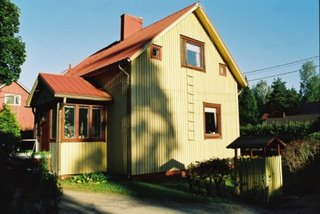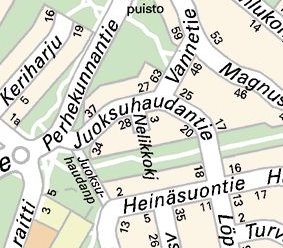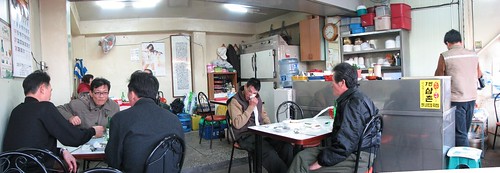 Ever since I learned that Korean residents in Finland use the Finnish word omakotitalo (detached house) instead of any Korean corresponding term (chut'aek, tandok chut'aek), I've taken that as indication of Koreans' attachment of marking and expressing social stratifications through forms and ownership of housing. Since the korean word chut'aek doesn't carry the connotations of middle-class security and attainment of a house of one's own that the corresponding Finnish word does, the latter is used instead, as if talking about becoming an owner of an esteemed and spacious apartment house in Korea. Now, early this week I got to know that also Italians in Finland resort to the word omakotitalo, which has gotten me thinking that it is actually us Finns who invest so much meaning and cultural value to the idea of "own home house" (literal translation of omakotitalo) and to becoming an occupant and owner of one. Foreign residents here only adopt the use of a word and a concept they have sensed to be very significant; they haven't necessarily borrowed a Finnish term and fitted it to their own conceptual and categorical palette, but adopted and fitted a part of our native thinking to their own. Ever since I learned that Korean residents in Finland use the Finnish word omakotitalo (detached house) instead of any Korean corresponding term (chut'aek, tandok chut'aek), I've taken that as indication of Koreans' attachment of marking and expressing social stratifications through forms and ownership of housing. Since the korean word chut'aek doesn't carry the connotations of middle-class security and attainment of a house of one's own that the corresponding Finnish word does, the latter is used instead, as if talking about becoming an owner of an esteemed and spacious apartment house in Korea. Now, early this week I got to know that also Italians in Finland resort to the word omakotitalo, which has gotten me thinking that it is actually us Finns who invest so much meaning and cultural value to the idea of "own home house" (literal translation of omakotitalo) and to becoming an occupant and owner of one. Foreign residents here only adopt the use of a word and a concept they have sensed to be very significant; they haven't necessarily borrowed a Finnish term and fitted it to their own conceptual and categorical palette, but adopted and fitted a part of our native thinking to their own.
In matters of contemporary society, Sweden is a place where equivalents of modern phenomena in Finland can also be found, and I thought that the Swedish term for detached house, egnahemshus, corresponding to the Finnish equivalent word by word, is one of those as well. As I had no Swedish speakers of Swedish language to consult, I resorted to The Search Engine, which to my surprise gave less than 400 hits to sites in Sweden but over 30 000 to sites in Finland. Only then it occurred to me that the word is actually a Finnish coinage, a translation loan for Swedish-speaking Finns. Now, does the Sweden-Swedish villa arouse similar sentiments among Swedes as the Finnish and Finland-Swedish concepts on this side of the Gulf of Bothnia.
 There is a recent novel on the topic, Juoksuhaudantie ("Trench Street"; review in English) by Kari Hotakainen, which sold hugely and won all the prices it could get. From the review: "When Matti [Virtanen]’s wife leaves him, taking their daughter with her, he thinks he can save the family by buying a detached house – the type of house owned by men who make no concessions in their marriage." Matti Virtanen is the most typical Finnish name one can imagine; to transfer the idea of the novel closer to the topics of this blog, image a Kim Chôl-su trying his utmost to have his family acquire a decent apartment house instead of the chônse (key money) place that they're living now, facing a nagging, unsatisfied wife who's been hinting of marital consequences if nothing happens, and the mounting hagwôn bills of the daughter. There is a recent novel on the topic, Juoksuhaudantie ("Trench Street"; review in English) by Kari Hotakainen, which sold hugely and won all the prices it could get. From the review: "When Matti [Virtanen]’s wife leaves him, taking their daughter with her, he thinks he can save the family by buying a detached house – the type of house owned by men who make no concessions in their marriage." Matti Virtanen is the most typical Finnish name one can imagine; to transfer the idea of the novel closer to the topics of this blog, image a Kim Chôl-su trying his utmost to have his family acquire a decent apartment house instead of the chônse (key money) place that they're living now, facing a nagging, unsatisfied wife who's been hinting of marital consequences if nothing happens, and the mounting hagwôn bills of the daughter.
Now that I think, Hotakainen's book has been in my shelf since last year. For the reasons of not having read it despite all the critical acclaim and general popularity, perhaps there's some uneasyness for not being able to correspond to this "own home house" pattern...
Categories at del.icio.us/hunjang: housing ∙ Korea-Finland ∙ stratification |















